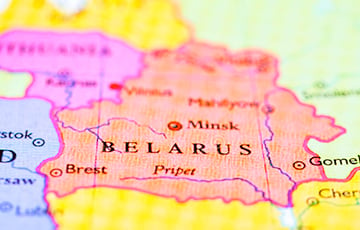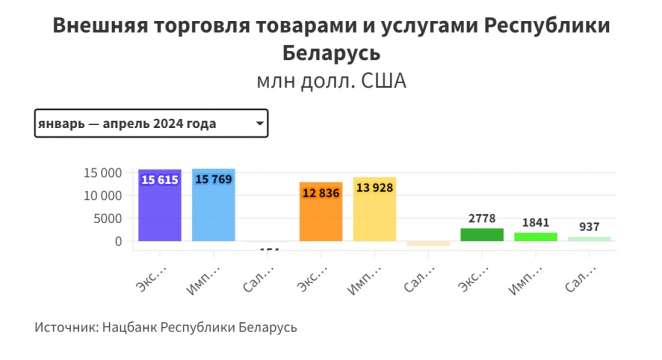Belarusians Will Face Black Market, Deficit And Foreign Currency Problems
8- ALES HUDZIYA, POZIRK
- 22.06.2024, 14:04
- 27,190

The "magic wand" broke down.
The economy of Belarus "worked perfectly" for five months of the year. In any case, this was convinced by Prime Minister Raman Halavchenka, reporting to Aliaksandr Lukashenka on June 17. However, there is a spoon of tar in a barrel of honey: exports are not growing according to the government's plans.
Apparently, the Prime Minister would be glad not to touch upon the problem of the negative balance of foreign trade at all, but when Lukashenka spoke about it, the topic had to be disclosed. "We will bring the blades of these scissors together," Roman Halavchenka promised. But will it succeed?
Usually services rescued it.
Let me remind you of the basics. Belarus' foreign trade consists of international trade in goods and services. Although the bulk of both exports and imports are related to goods, the effectiveness of foreign trade is largely determined by successes in the services sector.
The Belarusian economy buys a significant amount of goods, so often imports exceed exports. But with services, the situation is the opposite. Belarus sells them abroad much more than it buys, and IT and transport services are especially profitable here. This excess of exports of services over their imports usually makes it possible to compensate for the negative balance on goods.
But now the magic wand didn't work. In January-April, exports of goods and services amounted to 15 billion 615 million US dollars, while imports reached 15 billion 769 million US dollars. As a result, the net balance turned out to be negative — minus 154 million.

Imports overtake exports on all fronts.
In the current statistics of Belarusian foreign trade, it is important to note several points.
First, exports grow more slowly than imports. In the first four months of the year, supplies of Belarusian goods and services increased by only 2.1% compared to the same period last year, while purchases of foreign goods and services increased by 4.1%. And if in January-April last year the foreign trade balance was positive (147 million US dollars), now it is, as we can see, negative.
Secondly, the turnover of goods, which is traditionally the main engine of foreign trade, showed an increase of 3.8% in January-April 2024 compared to the same period in 2023. However, the foreign trade turnover of services, which usually supports the Belarusian economy, decreased (99.1%).
Thirdly, the dynamics of foreign trade in both goods and services is not in favor of Belarus. In the commodity sector, imports are growing faster than exports. In the services sector, exports are declining more than imports.
Thus, the indicators of the Belarusian economy in the foreign market sank in several directions at once.
Sanctions are still working.
Actual problems of Belarusian foreign trade are directly related to the effect of sanctions. A few years ago, the ideal diversification of foreign trade — "third-third-third" – between Russia, the EU and other countries was almost achieved. Now, more than two-thirds are accounted for by sanctioned Russia, and the remaining volumes mainly pass through its territory.
During this time, the key drivers of the Belarusian economy, such as IT and transport, have become the most stagnant industries, losing not only markets, but also human potential. These negative effects are entirely caused by the authorities' reaction to the 2020 events. As a result, innovations and full-fledged international cooperation have become unattainable for Belarusian companies.
The reorientation of foreign trade returned the Belarusian economy to a state close to the 90s, when the key market was Russian. However, if then Belarus had real prospects to expand the geography of foreign trade, now, on the contrary, the geography is narrowing.
Do not be seduced by the statements of the authorities about the brilliant prospects for trade with Africa and Asia. Orientation to local markets is a forced measure, it is necessary to sell goods and services where previously it was economically impractical. We risk repeating the experience of relations with Venezuela and Turkmenistan, where Belarusian goods and services were sometimes simply not paid for.
Of course, the Belarusian authorities now have no other choice. But the consequences of such decisions are obvious. Already now, following the results of four months of the year, we see signs of a breakdown in the long-term trend: exports of services to foreign markets begin to fall, which ceases to compensate for problems in trade in goods.
In the near future, the country may face a serious threat. First, you will have to spend gold and foreign exchange reserves, with the help of which the authorities usually cope with imbalances in foreign trade. When this source is depleted, the degradation of foreign trade awaits us.
As a result, the black market, deficits and multiple exchange rates will appear. It doesn't have to happen on the same day. But soon Belarusians can feel the forgotten symptoms of "the wild '90s".
Ales Hudziya, Pozirk










